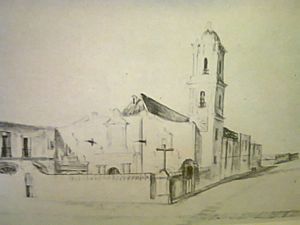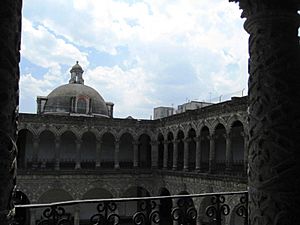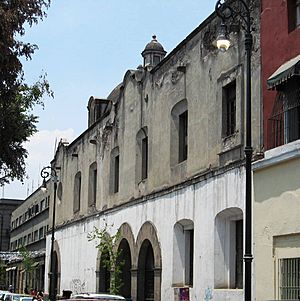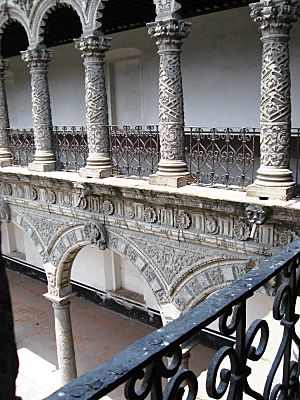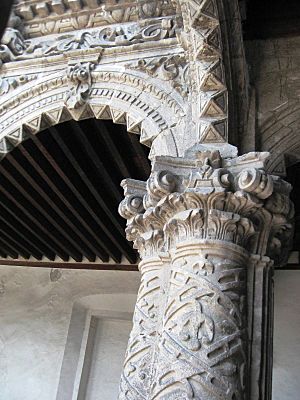Convent of La Merced, Mexico City facts for kids
The Convent of Nuestra Señora de La Merced was a large religious building in the Historic center of Mexico City. Most of this old complex was taken down to make room for new buildings. Today, only a beautiful part called the cloister remains. This cloister was part of a monastery built in the late 1500s and early 1600s. It was built by the Mercedarian order, a group of Catholic priests.
You can find the cloister on Uruguay and Talavera Streets in the historic downtown of Mexico City. The entire area around it is even named "La Merced" after the old convent. This name also inspired the nearby metro station and the famous neighborhood market.
Contents
History of the La Merced Convent
The Order of Mercedarians arrived in Mexico in 1593. They built the La Merced Monastery in Mexico City before setting up churches elsewhere. The famous architect Juan de Herrera designed and built this complex. The church, which is now gone, was started in 1594. It was finished by the mid-1600s. The upper floor of the cloister was completed later, around 1703.
Changes Over Time
In 1862, many religious buildings were destroyed because of new laws called the Reform Laws. The church and other parts of the La Merced monastery were torn down. Only the cloister you see today was left. We know what the monastery looked like before from a painting by Pedro Gualdi from 1842.
After the Reform Laws, the cloister was used for many different things. First, it became a military barracks. This caused some damage to its outer walls. Later, it was a gymnasium, a school, and even a museum. It also served as a child care center and a workshop for making tapestries.
Saving the Cloister
The cloister survived partly because of an artist named Dr. Atl. He lived and worked there in the 1920s. When he moved in, the building was in very bad shape. He even had to live on the roof! Dr. Atl later helped fix up the patio and other parts of the building. He also replaced the railings on the upper floor. From 1927 into the 1930s, the cloister was home to a famous art school. This school was called the National School of Painting, Sculpture, and Printmaking.
Design and Architecture
The La Merced cloister is known for its beautiful mix of styles. It combines Baroque and Mudéjar elements. Many people say it is one of the most beautiful monasteries ever built in Mexico. This is because of its detailed decorations.
In the center of the cloister is a patio. This patio is surrounded by two floors of columns and arches. Behind these arches are walkways. A large staircase leads up to the second floor and a tower near the street. On each of the patio's four sides, there are seven columns on the ground floor. These columns then split into fourteen columns on the upper floor.
The columns on the ground floor are in the Doric style. The center stone of each arch has a medallion. These medallions show pictures of apostles or Mercedarian friars. The columns on the upper floor were built later. They have much more decoration than the lower ones. These columns are covered with patterns that look like lattices mixed with leaves and fruit. The spaces between the columns are decorated in the Baroque style. They have carved images of Mercedarian friars in the triangles above the arches. Small pyramids point downwards from the undersides of the arches.
See also
 In Spanish: Convento de la Merced (Ciudad de México) para niños
In Spanish: Convento de la Merced (Ciudad de México) para niños
- List of colonial churches in Mexico City
 | Lonnie Johnson |
 | Granville Woods |
 | Lewis Howard Latimer |
 | James West |


